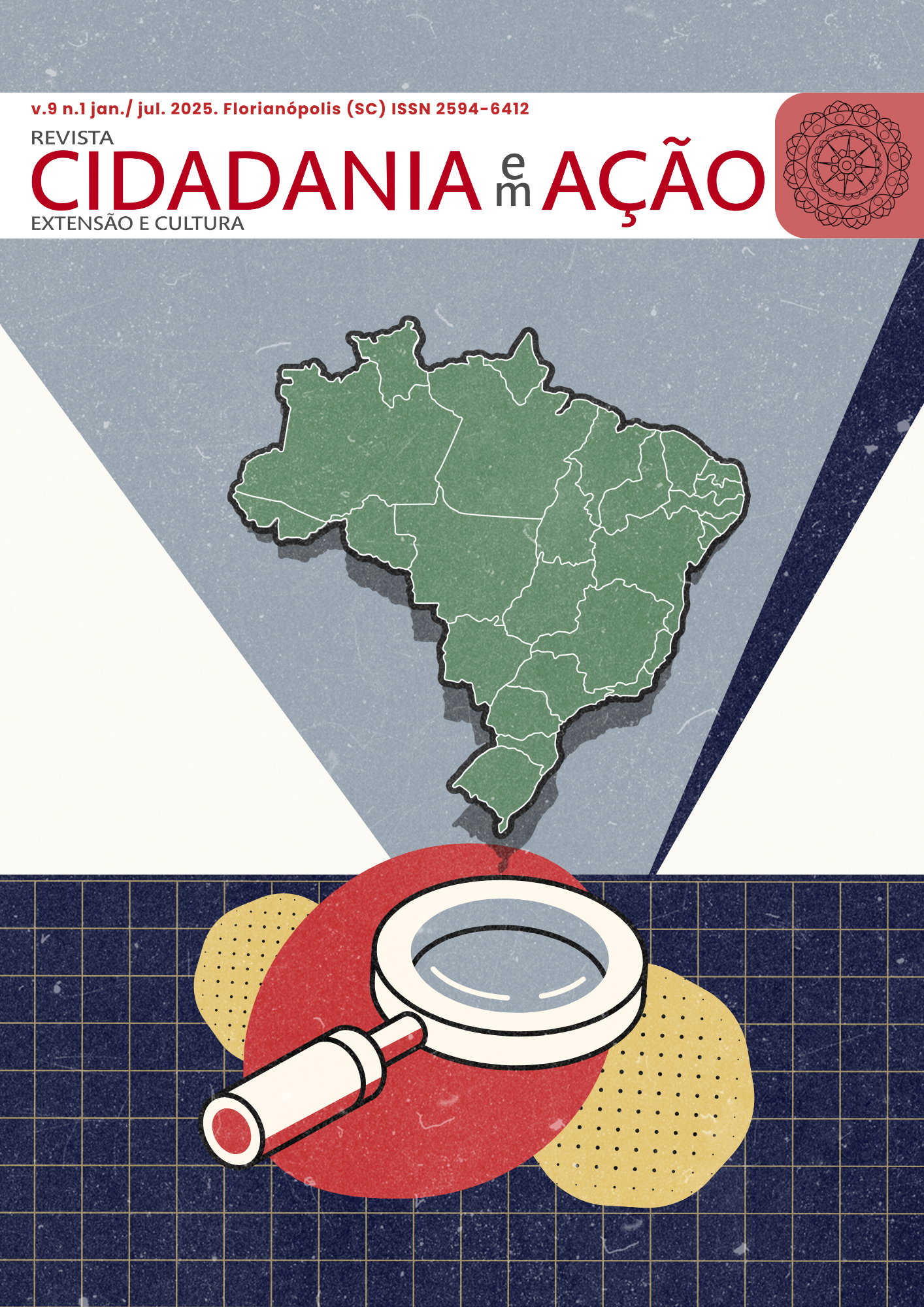ENSINO DE LÍNGUA INGLESA PARA A TERCEIRA IDADE
motivações e concepções dos participantes envolvidos no processo de aprendizagem de língua estrangeira
DOI:
https://doi.org/10.5965/259464120901e2642Keywords:
Ação extensionista, Ensino de Língua Inglesa, Terceira idadeAbstract
This paper aims at presenting some results obtained in an extension project developed within a public institution in the region known as “Alto Vale do Itajaí”, in Santa Catarina. The extension project entitled “Basic English Course for Seniors” aimed at offering English language classes to groups over 55 years old in a region marked by German colonization, that is why it might be considered a complex sociolinguistic scenario. Our discussion is based on field data collected during the activities of the project. Learning a new language, besides being a challenging experience, offers the discovery of new resources and skills and it reveals itself as a stimulus to the learner. The analyzed data indicates the motivations for instrumental and integrative orientation of the participants. Through the interaction among the participants in the classes it was possible to observe that life experiences, especially childhood memories, stand out in their conversation in class. Thus, it might be assumed that the students’ conception and beliefs that personal experiences are part of the language learning process become evident. It is assumed that learning a foreign language will contribute for the elderly to remain socially active, in addition to providing contact with new cultures and new individuals.
Downloads
References
ALVES, D. S. O envelhecimento e a importância da convivência social e familiar: estudo sobre um grupo de convivência na cidade de Cruz das Almas - Bahia. 2014. 93 f. Trabalho de Conclusão de Curso (Bacharelado em Serviço Social) – Centro de Artes, Humanidades e Letras, Universidade Federal do Recôncavo da Bahia, 2014.
ATKINSON, D. The mother tongue in the classroom: a neglected resource? ELT Journal, v. 41/4, Oct. 1987.
BARCELOS, A. M. F. Crenças sobre aprendizagem de línguas, lingüística aplicada e ensino de línguas. Linguagem & Ensino, Pelotas, v. 7, n. 1, p. 123-156, jan./jul. 2004.
BRASIL. Estatuto da pessoa idosa. Brasília: Senado Federal, Subchefia para Assuntos Jurídicos, 2022.
BROWN, H. D. Principles of language learning and teaching. New York: Longman, 2000.
CAVALCANTI, M. C. Estudos sobre educação bilíngüe e escolarização em contextos de minorias lingüísticas no Brasil. DELTA, São Paulo, v. 15, p. 385-418, 1999. Edição especial.
CONFORTIN, H. O aprendizado de língua estrangeira por adultos: reflexões necessárias. PERSPECTIVA, Erechim, v. 37, n. 140, p. 7-18, dez. 2013.
FERNANDES, K. A. R. A aprendizagem de línguas estrangeiras na idade adulta: fatores envolventes. In: CONGRESSO NACIONAL DE EDUCAÇÃO, 10.; SEMINÁRIO INTERNACIONAL DE REPRESENTAÇÕES SOCIAIS, SUBJETIVIDADE E EDUCAÇÃO, 1., 2011, Curitiba. Anais [...]. Curitiba: Pontifícia Universidade Católica do Paraná, 2011.
FLICK, U. Introdução à pesquisa qualitativa. Tradução: Joice Elias Costa. 3 ed. Porto Alegre: Artmed, 2009.
GRAY, D. E. Pesquisa no mundo real. Tradução: Roberto Cataldo Costa. 2 ed. Porto Alegre: Penso, 2012.
HALL, S. A identidade cultural da pós-modernidade. Tradução: Tomaz Tadeu da Silva e Guaracira Lopes Louro. 11 ed. Rio de Janeiro: DP&A, 2006.
HALU, R. C.; PARANÁ, J. M. Análise de conflito de crenças sobre o aprendizado de línguas estrangeiras: o aluno adulto na crise do nível intermediário. Revista X, [s.l.] v. 1, p. 42-50, 2007.
LEWGOY, A. M. B.; ARRUDA, M. P. Novas tecnologias na prática profissional do professor universitário: a experiência do diário digital. Revista Textos e Contextos: coletâneas em serviço social, Porto Alegre, n. 2, p. 115-130, 2004.
MAAS, M. R. Escolarização e língua de imigração: representações a partir de enunciados de três gerações. 2016. 91 f. Dissertação (Mestrado em Educação) – Faculdade de Educação, Fundação Universidade Regional de Blumenau, Blumenau, 2016.
MARTINS, S. C. Relato de uma experiência de ensino de língua italiana para a terceira idade: desconstruindo concepções e arquitetando uma nova visão de mundo. Trab. Ling. Aplic., Campinas, n. 56, v.1, p. 117-137, jan./abr. 2017.
OLIVEIRA, H. F. À flor da (terceira) idade: crenças e experiências de aprendizes idosos de língua estrangeira (inglês). 2010. 192 f. Dissertação (Mestrado em Linguística Aplicada) – Programa de Pós-graduação em Linguística Aplicada, Universidade de Brasília, Brasília, 2010.
OLIVEIRA, H. F. Percepções de adultos sobre aprender língua inglesa. Poiésis Pedagógica, v. 5/6, p. 147-166, jan./dez., 2007/2008.
PEREIRA, E. T. O idoso e o aprendizado de uma nova língua: o descortinar de trocas sociais e afetivas. 2005. 225 f. Dissertação (Mestrado em Gerontologia) – Pontifícia Universidade Católica de São Paulo, 2005.
RICHARDS, J. C. Interchange intro: student book. 4 th. Cambridge: Cambridge University Press, 2012.
SERRONHA, M. M. B. A aprendizagem do inglês na idade adulta: percepções de especialistas, formadores e formandos. 2010. 164 f. Dissertação (Mestrado em Ciências da Educação) – Instituto Politécnico de Beja, Escola Superior de Educação, Universidade do Algarve, Faro, 2010.
Downloads
Published
How to Cite
Issue
Section
Categories
License
Copyright (c) 2025 Citizenship in Action: Extension and Culture Magazine

This work is licensed under a Creative Commons Attribution 4.0 International License.












